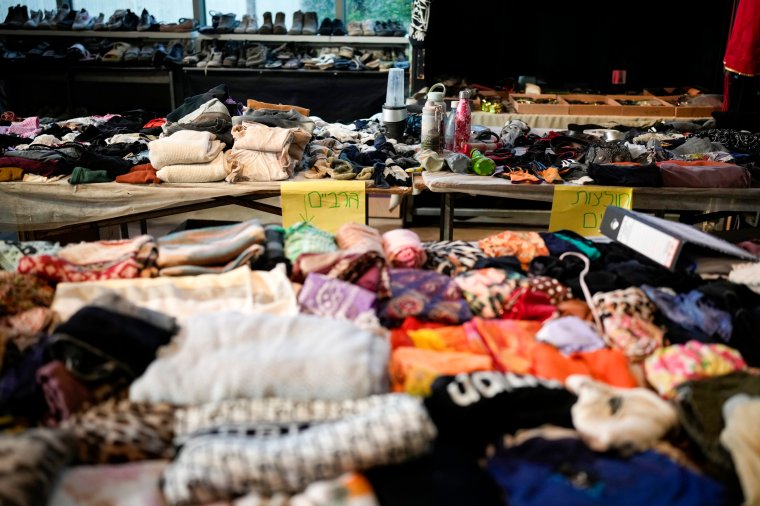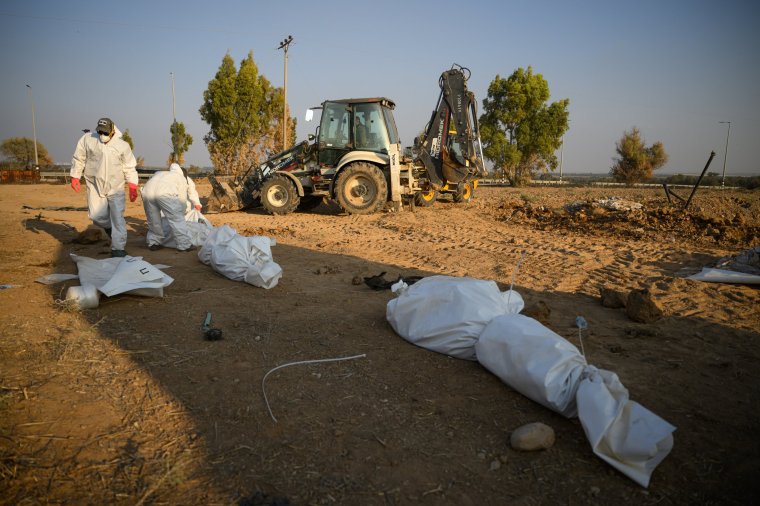Content warning: This article contains disturbing and graphic content and descriptions of sexual violence and mutilation
On 7 October, Hamas attacked southern Israel, storming communities, army bases and a music festival and massacring 1,200 people. Less frequently heard are the horrific allegations of brutal sexual violence against women from that day. Now, Israeli police and a civilian commission are collecting testimony from witnesses and gathering footage to try to piece together what happened.
It is not known how many women were assaulted during the attack. Few survived, and obtaining accounts from those who did will be a difficult task, with survivors likely to be traumatised and unwilling to describe what happened to them.
i has spoken to witnesses, investigators and organisations working to help survivors, and has seen some of the evidence they have gathered, but was unable to independently verify the reports.
Simcha Greiniman, a volunteer emergency responder, was one of the first people to witness the aftermath of the attack. “Those are not things that you can explain or think about. We are dealing with monsters, not even animals,” he tells i.
Mr Greiniman, 46, volunteers with Zaka, a community emergency response group, made up largely of Ultra-Orthodox Jewish volunteers. They were one of the first organisations that arrived to collect bodies from the kibbutzim overrun by militants on the day of the massacre.

He does not want to specify the kibbutz in which he worked, but says he saw the body of a woman violated with an object in an obvious sign of sexual violence.
“There is no question there was sexual violence. The amount of women who were naked…” he says. “It’s not something you can understand, what was the point of doing that?”
Reports have emerged of widespread rape and violence against women by Hamas on 7 October. The first indication came from Hamas, when they started live-streaming their atrocities. Some of the footage showed women being stripped, and bodies with signs of gender-based attacks.

A spokesperson for the Israeli police has told i that it will soon hold an update briefing on its national investigation. At a Knesset hearing late last month, police told the Israeli parliament that women were sexually assaulted in the 7 October attack and presented graphic witness evidence.
Sarah Weiss Ma’udi, an official at Israel’s ministry of foreign affairs, condemned the response of “all major women organisations”, including umbrella organisations at the UN, telling i they were “very simply just being completely silent” over the reports of sexual violence during Hamas’s attack.
On Friday, nearly two months after the massacre, UN Women released a statement voicing “alarm” over the reports of sexual violence.
Shari Mendes, a volunteer at the main morgue at the Shura military base in central Israel, was responsible for preparing women’s corpses for burial. Ms Mendes, 60, an architect from Jerusalem, described seeing the bodies of female soldiers who had been shot in the genital area. “That was seen, that I can testify to,” she tells i.
She said she and her team had sought to treat the bodies with the utmost care, balancing a religious and ethical need to treat them sensitively with the urgency to “keep moving” to inform families of the victims.
“It was a lot of stress, it still is, we’re still on call in this unit,” she said. “But during those moments, we loved these women, we loved them like they were our daughters and we took time, we honoured them and we knew we would probably be the last people to ever touch them, to ever see them.

“We felt that was a very special, holy honour for us and we took the time to do that for them.”
Orit Sulitzeanu, chief executive of the Association of Rape Crisis Centres in Israel, confirmed that her organisation had received information about survivors and witnesses of rape from 7 October.
“It’s unbelievable,” Ms Sulitzeanu said. “I saw all the photos and clips I could put my hands on… it’s horrible, it’s unbelievable but I wanted to see that because I wanted to know.”
Witnesses have described seeing women being raped before being murdered or taken to Gaza.
Dr Cochav Elkayam-Levy, the chair of Israel’s civilian commission, last month presented evidence it has collected including footage released by Hamas, witness testimony and accounts from first responders, as well as militants captured and interrogated, and interviews with medical and morgue staff.
This included testimony in which a survivor reportedly told Israeli police that he saw Hamas fighters taking turns raping a woman, mutilating her and then shooting her during the assault.
Dr Elkayam-Levy, an international law expert at Hebrew University, said one captured militant had confirmed “their actions included beheading people” and desecration of bodies, and that one said they had captured women and children “to have our way with them… to dirty them… to rape them”.
Ms Weiss Ma’udi, who was the first Israeli diplomat to be appointed to the cabinet of the UN General Assembly president, said: “This seems to very much be both systematic, they got clear instructions from above, and widespread, that you’re just seeing case after case.
“In international criminal law, using rape as a tool of war is a war crime. If you have it in a widespread, systematic way, it’s a crime against humanity, which is the next level up.
“We never really saw sexual violence on a mass scale, this is very much a game-changer.”
Israeli officials point out that the magnitude of the massacre on 7 October meant forensic scientists’ main focus was on establishing the identities of those killed, rather than collecting evidence of rape.
Ms Sulitzeanu says we may never know how many people were raped, but that their bodies were “shouting” out the signs of sexual violence. She assumes there are, at most, a few dozen survivors and witnesses but says it will take a long time before they are ready to talk about “the most horrible trauma”.
She said that her grandmother, a Holocaust survivor who was taken to Auschwitz as a child, was 80 before she spoke about seeing the rape of a woman by Russian soldiers who had liberated the concentration camp.
Ms Sulitzeanu said reliving the horror while fearing you would be burdening your loved ones with it it was “like torture” for survivors, and that many might feel a sense of shame.
‘Why the silence?’
On 2 December, UN Women issued a statement condemning the Hamas attacks, saying: “We are alarmed by the numerous accounts of gender-based atrocities and sexual violence during these attacks. We reiterate that all women, Israeli women, Palestinian women, as all others, are entitled to a life lived in safety and free from violence.”
The UN announced last week that its Commission of Inquiry (COI) investigating war crimes on both sides of the conflict would include sexual violence by Hamas. Navi Pillay, the inquiry chair, said she would pass the evidence on to the International Criminal Court.
Israel, however, has not co-operated with the UN commission, accusing it of having an anti-Israel bias, and the commission could struggle to gather sufficient evidence to support future charges if access is not granted.
“It’s too little too late,” Ms Weiss Ma’udi said. “Why the two months of silence?” She said the UN’s “glaring” silence until last week was “making a statement that it could be okay to use rape and sexual violence in certain contexts”.
The UN should “believe us” and speak out about what happened, “not call for ‘verification’ or an ‘investigation'”, she said. She also criticised the UN for assigning the case to the COI, which she described as “the embodiment of a kangaroo court”.
Ms Weiss Ma’udi said the commission had been “purposely created to delegitimise and criminalise Israel”.
Dr Cochav told i the committee she chairs had previously written to relevant international bodies with the support of 160 international law and human rights experts about the “crimes against humanity” committed against women and girls on 7 October.
But there was no response, she said.
In response to questions sent before the COI’s investigation was announced, UN Women told i that it had been providing “concrete support” to the COI from “very shortly after the attacks occurred”.
A spokeswoman added that the UN Action network had been activated to proactively share UN-sourced and verified information to aid all investigations.
“We continue to believe that a full and authoritative investigation, including through the efforts of the Commission of Inquiry, and the accountability and justice for women that comes from it must be a key priority,” she added.
i has contacted the UN for a response regarding claims of the COI’s alleged bias.


